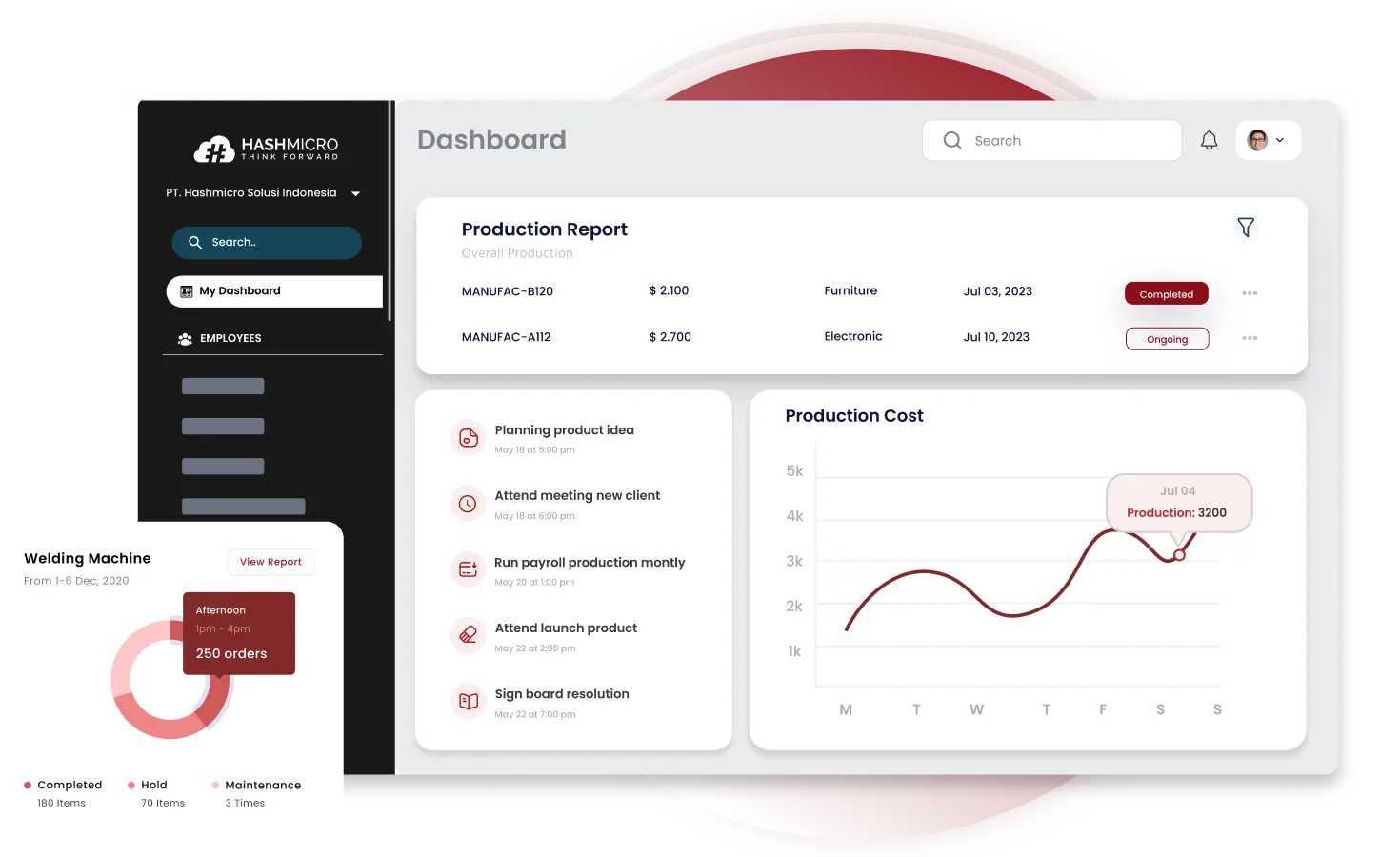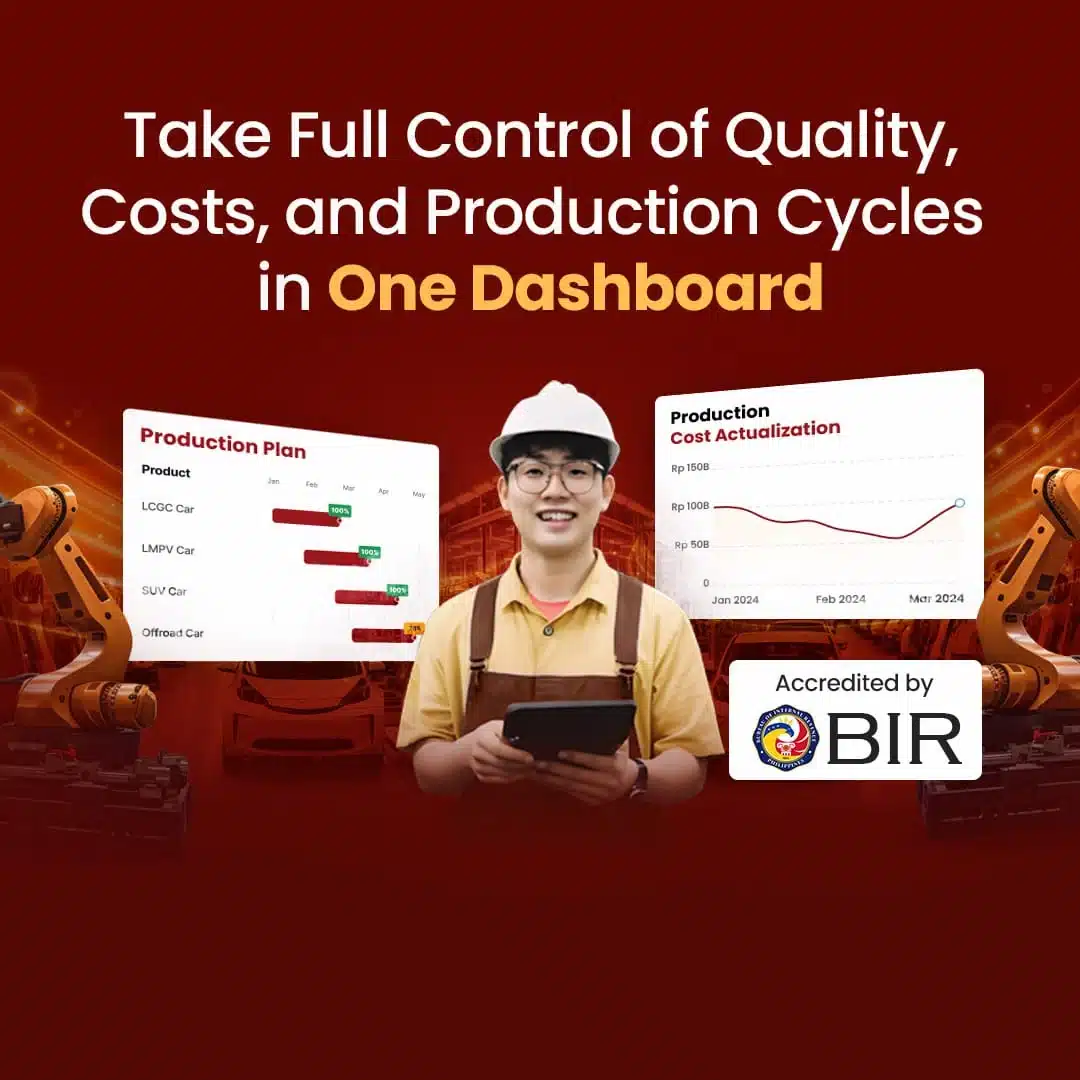Imagine managing a manufacturing operation where delays are frequent and inventory is a mystery. Without the right manufacturing software, these challenges can simplify your company’s growth and profitability.
Manufacturing software also has several types, each type with different functions. Understanding what type is suitable for your business needs is also important to maximize the efficiency of the software.
In this article, we’ll explore various types of manufacturing software. You’ll discover how the right tools can streamline operations, boost productivity, and keep your business competitive.
Table of Contents
1. ERP Software
Enterprise Resource Planning (ERP) software is an essential tool for manufacturers, integrating various business operations such as production, manufacturing accounting software, and supply chain management software into a unified platform. This type of manufacturing software is vital for companies that require a holistic view of their operations to manage day-to-day activities effectively.
The strategic advantage of using an ERP system in manufacturing lies in its ability to enhance efficiency and reduce costs through optimized resource management. The technology grants visibility across all areas of manufacturing, allowing for better coordination and streamlined processes. This central management capability makes it easier to respond to operational challenges and adapt to market changes quickly.
In essence, ERP manufacturing operations software is indispensable in the manufacturing industry, acting as a lifeline that supports a complex process of business functions. It not only ensures compliance and simplifies project management but also serves as a critical tool in transforming resource management and operational strategies.
Also read: Understanding MES vs. ERP
2. Manufacturing Execution Systems (MES)
Manufacturing Execution Systems (MES) focus on monitoring and controlling the production process in real-time. They optimize production outputs by tracking data, allocating resources, and providing visual shop floor representations.
This manufacturing planning software is crucial for production managers and shop floor supervisors, offering insights to manage and improve each stage of manufacturing. MES often integrates with ERP systems to ensure seamless information flow between production and other business areas.
For efficient production planning and execution, MES is the ideal choice. It enhances productivity, resource utilization, and operational agility by providing detailed insights and control over the manufacturing process.
If you’re interested in exploring more about how MES software works, HashMicro provides a free demo to give you a full insight into its comprehensive solutions. You can also download the price scheme below.

3. Product Lifecycle Management Tools
Product Lifecycle Management (PLM) tools are essential for manufacturers aiming to manage product data throughout their entire lifecycle. These tools serve as centralized hubs for all information related to product requirements, parts, manufacturing documents, engineering changes, and quality workflows.
A well-developed PLM solution provides a holistic view of product development, from inception to retirement. By leveraging PLM tools, manufacturers can boost productivity and maintain high-quality standards for their products.
For those seeking to streamline product development and ensure consistent quality, PLM tools are invaluable. They offer comprehensive oversight and facilitate efficient management of all product-related information.
4. Statistical Process Control Solutions
For manufacturers, few things are as damaging as poor product quality, often caused by mishaps during production processes. Statistical Process Control (SPC) software helps prevent these issues by employing industry-standard methods for real-time quality control.
SPC scrutinizes data from various measurements to identify unacceptable variations that need correction. This real-time analysis ensures that any defects are addressed promptly, maintaining high quality throughout the production process.
By implementing SPC software, manufacturers can maximize productivity, improve quality, and reduce costs associated with defective products. It is an essential tool for maintaining consistent production standards and minimizing waste.
5. Computer-Aided Manufacturer Software
Computer-Aided Manufacturing (CAM) software transforms computer-aided designs into actionable instructions for machinery. This conversion allows machines to create finished products directly from digital designs, streamlining the manufacturing process.
By using CAM software, manufacturers can produce goods without manually setting up and operating machinery, saving time and reducing errors. It is especially beneficial for production managers and shop floor employees seeking efficient and precise production methods.
6. Enterprise Asset Management Software
Enterprise Asset Management (EAM) software is crucial for asset-heavy sectors like construction, energy, and manufacturing. It allows companies to monitor and analyze the performance of all physical assets, ensuring proper maintenance and optimal equipment health.
These systems are particularly beneficial for large enterprises with extensive asset ranges, simplifying the process of asset management. EAM software helps forecast equipment failure by integrating data from connected devices with artificial intelligence, reducing downtime and maintenance costs.
In industrial manufacturing, IoT-powered EAM solutions are increasingly popular, enabling remote asset monitoring. This advanced technology helps companies avoid unnecessary losses and maintain efficient operations.
7. Computerized Maintenance Management Systems
Computerized Maintenance Management Systems (CMMS) are essential for ensuring efficient production by preventing asset breakdowns. These systems centralize maintenance-related information, making it easier to keep equipment in optimal condition.
Unlike Enterprise Asset Management (EAM) software, which covers various business functions, CMMS specifically focuses on maintenance. By using CMMS software, companies can optimize the utilization of machinery, vehicles, and plant infrastructures, leading to higher efficiencies and reduced costs.
CMMS simplifies the process of scheduling and tracking maintenance activities. This focused approach ensures that all assets are well-maintained, minimizing downtime and enhancing overall productivity.
8. Inventory Management Solutions
Effectively managing inventory levels is crucial for any organization selling goods, making inventory management software essential for manufacturers. These solutions provide real-time inventory data and automate stock tracking, product reordering, and warehouse management.
By using inventory management software, companies can increase profitability by reducing out-of-stocks and minimizing overproduction. This automation ensures efficient stock control, helping manufacturers meet customer demand without unnecessary excess.
9. Supply Chain Planning Tools
Supply chain planning tools extend beyond basic inventory management, encompassing all aspects of delivering goods to customers. These solutions help detect supply chain issues and provide strategies to avoid them with minimal losses.
By predicting supply and demand, operation management software with supply chain planning tools streamlines planning and delivery schedules. This ensures that manufacturers have full visibility into their shipping processes, allowing them to enhance overall production efficiency.
With well-developed supply chain planning software, companies can streamline logistics and improve coordination. This results in a more efficient manufacturing process and better customer satisfaction.
10. EHS Software
In manufacturing, regulatory compliance is crucial for ensuring employee safety and environmental protection. Environmental Health and Safety (EHS) software helps companies adhere to various laws and regulations.
EHS solutions serve as central hubs for storing and analyzing information related to workplace health, safety, waste outputs, and sustainability. They help manufacturers track hazardous materials, perform inspections, and monitor environmental metrics.
By using EHS management software, companies can reduce workplace risks, decrease waste generation, and maintain compliance with important regulations. This proactive approach enhances overall safety and environmental responsibility.
11. Job Shop Management Software
Job shop management software is ideal for small manufacturing firms that don’t need the extensive features of large ERP systems. It offers similar functionalities but is more suited to the scale and needs of smaller operations.
This software allows you to manage sales, purchasing, inventory, low-scale production, and even manufacturing accounting tasks. However, it is not typically chosen by large enterprises due to its limited scalability.
12. Engineer-to-Order (ETO) Software
Engineer-to-Order (ETO) software is designed for manufacturers who create custom products or projects. It serves as an excellent tool for cost estimation and managing the entire process from concept to final product.
ETO software helps businesses engineer unique solutions that meet specific client requirements, optimizing each step of the production process. It’s the perfect tool for manufacturers who craft personalized experiences rather than just standard products.
13. Material Requirements Planning (MRP) Software
Material Requirements Planning (MRP) software is essential for organizing inventory, production schedules, and resource planning. It ensures manufacturers have the right materials at the right time to meet production demands.
While sharing features with ERP systems, MRP software is particularly useful for manufacturers dealing with fluctuating demands and material experiments. It helps maintain harmony in production processes, adapting to changing requirements with ease.
14. E-Commerce Software
E-commerce software in manufacturing acts as a 24/7 storefront, enhancing sales efficiency. It helps manufacturers reach a broader audience and sell products online seamlessly.
By integrating online sales platforms with manufacturing processes, this software allows efficient management of orders, inventory, and shipping. It serves as the modern bridge connecting the production floor to the digital marketplace, ensuring smooth operations and increased sales.
15. SKU Management Software
SKU Management software streamlines a manufacturer’s workflow by tracking every product variation, size, color, or style efficiently. It ensures that every product is easily identifiable and manageable within the inventory.
Like a meticulous librarian cataloging books, SKU management software keeps everything in its rightful place. This organization makes retrieval and inventory management easier, enhancing overall efficiency.
16. Administrative Tools
Administrative solutions are a vital type of manufacturer software, supporting basic business operations. These tools can be categorized into three main types, often used across various sectors.
While you may already be familiar with them, it’s crucial to recognize their importance in streamlining administrative tasks. They ensure that core business functions run smoothly, providing essential support to manufacturing operations.
Read More: Top Manufacturing Inventory Software
Choose The Right Manufacturing Software for Your Business
HashMicro stands out as the best ERP manufacturing software in the Philippines, offering unparalleled solutions for businesses of all sizes. Its advanced technology provides comprehensive manufacturing solutions that are fully integrated, ensuring seamless operations across all departments.
With HashMicro, you can automate your manufacturing processes to achieve maximum efficiency, making it ideal for managing complex manufacturing operations. By leveraging this software, you can streamline every aspect of production and reduce operational costs. We invite you to try a free demo to experience the benefits firsthand.
Here are some key features of HashMicro manufacturing production software:
- Manufacturing Production Scheduling: Forecasts production needs based on historical demand, ensuring you always meet customer expectations.
- Manufacturing Requisition Planning: Streamlines the process of requesting materials, helping you maintain optimal inventory levels.
- Quality Control: Ensures that every product meets high standards through rigorous testing and monitoring.
- OEE Tracking: Provides insights into the overall efficiency of your equipment, helping you identify areas for improvement.
- Multi-Level BoM: Manages complex assemblies with ease, allowing for detailed tracking of components.
- Production Order & Work Order Tracking: Keeps you updated on the status of each job, ensuring timely completion.
- Material, Labor & Overhead Costs Management: Helps you stay on budget by efficiently managing all costs associated with production.
Also read: Top Manufacturing Asset Management Software
Conclusion
From ERP and MES systems to PLM tools and SPC solutions, each software type offers unique benefits to enhance your manufacturing processes. Choosing the right manufacturing software is essential for overcoming operational challenges and achieving business success.
HashMicro stands out as the best ERP manufacturing software in the Philippines, providing comprehensive solutions with advanced technology and complete integration. It automates manufacturing processes to achieve maximum efficiency, making it suitable for complex manufacturing operations.
Optimize your operations and stay ahead in the competitive market with HashMicro’s state-of-the-art manufacturing software, try the free demo now!















































